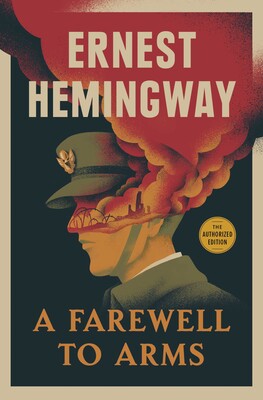lux ⛥ reviewed Farewell to Arms by Ernest Hemingway
Review of 'Farewell to Arms' on 'Goodreads'
5 stars
There are times when the tumultuous emotion of a novel hinders an honest opinion. There are even times when the unexpected twists of an author’s imagining leave the reader with a quiet sense of baffled awe. Combined, these factors may result in a truly interesting review. Being only the second novel by Hemingway I have had the chance to read, A Farewell to Arms has left a powerful, albeit mournful impression.
The story of a troubled ambulance driver during World War I, coupled with a thoroughly depressing conclusion, is classic Hemingway. Various themes including the morbid nature of war, the relationship between love and hurt, and the patterns of human nature can be found in this novel and even recurring in much of Hemingway’s literature. The unemotional male protagonist, Henry, is the the product of these themes, a victim of life’s suffering and its many complexities.
There are aspects of A Farewell to Arms that require a slow mental digestion to appreciate the soul of the novel. Overall, I found the direct and terse prose of the writing a very accommodating feature to Hemingway’s themes. Henry’s mental dialogue quickly gives insight into the persona of the character. He is constantly besotted with various internal conflicts, all of which could lead to a certain self-understanding, but fail to do so as the book draws to a closure. The reader is left unpleasantly perplexed, in an unsatisfying way. This was obviously Hemingway’s intention as an artist; he was a crafting a portion of his spirit into words. The ending of the novel could be likened to the author’s state of mind itself.
One of the most poignant themes or messages of A Farewell to Arms is the terrible price of war. Throughout the plot, readers will notice that Henry is progressively distancing himself from the harsh realities of blood and warfare. With his highly direct method of writing, Hemingway uses powerful imagery in a casual way to provoke understanding within his readers. The pain, brutality, and at times utter chaos of Henry’s situation is seen as a character building (or possibly degrading) force in his life.
A Farewell to Arms was by no means written by someone who fully condemned war, but rather embraced the inevitability of it. Throughout the novel, Hemingway expresses his sentiment that war is merely the product of an already dark and tyrannous world. He accurately portrays the fickle nature of humanity; at times we can be cruel, and at times we can be murderers. However, we are also capable of compassion, integrity, and even nobility, despite society’s frequent attempts to forget or dispel true love. Yes, in a nutshell, A Farewell to Arms can be said to condemn war. However, I believe this sentiment is deeper and much more faceted in the mind of Hemingway.
A second theme prevalent in the novel, and also one of Henry’s chief struggles, is the often correlating relationship between love and hurt. In the beginning of A Farewell to Arms, Henry and Catherine (his newfound lover) find comfort in each other. They find solace from their own mournings and inner demons. This relationship evolves dramatically throughout the course of the book, and soon becomes a driving force in either’s life. Henry becomes torn between this unprecedented love for a woman, and his drive to get back to the front as soon as possible.
Henry understand the importance of his love for Catherine and how meaningful this type of bond can be in times of war. He realizes the emptiness of concepts such as honor and duty in the face of true love. This realization results in a terrific internal struggle. Henry repeatedly must come to terms with the “numb” mentality he adopted during war in order to open his heart for the woman he loves. Henry struggles with openness and sincerity but always manages to make a connection with Catherine.
I believe Hemingway was expressing one of the great morals of life: love in the face of fear, destruction, and tyranny can compel the inner compassion of a person to manifest. There is no force as powerful as love, save possibly fear. Henry is besotted by both, an onslaught of emotional turmoil that rips apart his conviction and decimates his previously held superficial values. The genius of Hemingway is his tendency to be completely realistic. He has the remarkable ability to capture the true essence of human nature.
All in all, A Farewell to Arms is a powerful symbol of the relationship between love and war in a man’s heart. It is an accurate description of the havoc a relationship can wreak on a man’s mentality. This novel is an incredible sentiment to what it means to be human, and the subtle intricacies of the human psyche are portrayed with striking accuracy. Hemingway captured the mutual destruction of both love and war. I could recommend this timeless classic to any reader, just for its invigorating if depressing breath of reality. However, some may dislike the harsh honesty in the authors word’s and cold precision in which he utterly nails human nature. I for one, appreciate this sincerity, this side of the story that only a few of the great classics sometimes expound upon. A Farewell to Arms is truly one of the most powerful pieces of literature when it comes to the effects of war on humanity. Readers should look for the connections and cause & effect relationships in this destructive, yet powerfully insightful novel.

